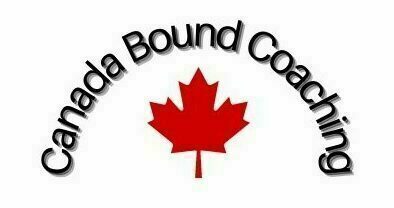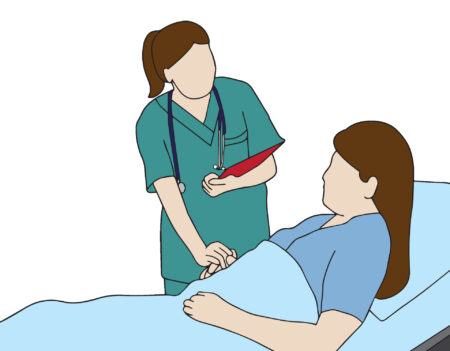Inside: Learn from her experience in becoming a nurse in Canada ( Ontario ) – challenging but fulfilling!
Here’s a Q and A with Vera, a newly-licensed RPN ( Registered Practical Nurse ) in Toronto, Ontario.

You’re now an RPN, a registered practical nurse in Ontario, so where do you work now?
“At a long – term care facility located at the east end of Toronto. “
What is your position & what are your duties?
” I am an RPN, mainly responsible for providing care for the residents and implementing the nursing process, including medication administration, physical assessment, proper intervention, evaluation, and documentation.
Part of my job is also being responsible for supervising PSWs ( personal support workers ) and non-regulated professionals within the facility. “
Any challenges that you encountered in your first few weeks?
” Previously working as an administrative nurse for six years in my home country, was a great experience for me.
Before that, I was an ER nurse working overseas, and every day, I encountered a lot of stress. Though the work was very fulfilling, it was very demanding and tough. So, when I experienced working outside the hospital setting, it was a relief, and it became my comfort zone.
However, transitioning back to bedside nursing now, gave me a hard time.
The first day I worked after a six-day orientation, I did not do well. I did not finish my tasks, and I felt overwhelmed by the vast amount of information from the orientation and the expectations from the management.
I even cried during my first week. I did not have the chance to take my breaks because I was trying my very best to accomplish everything on time.
As well, the communication barrier was also my biggest challenge since 100% of the population in that facility only spoke Cantonese/Mandarin. Though a few staff spoke English, I still found it difficult to communicate with everyone effectively.
I always feel left out and like I don’t belong when I’m around the nursing station. “
To the more important question that many of our readers want to know, how did you get started to be recognized as RPN in Ontario?
” My experience is a bit different from others, I think.
I began my application for NNAS (the national body that assesses internationally educated nurses applying to become RNs and RPNs in Ontario) two months in 2022 before moving to Canada, even before the migration process.
I submitted my school documents and licensing board documents for processing. When I received my advisory report (AR), it was partially comparable to RPN. At that time, we didn’t know about the process change where non-comparable RN applicants were required to do bridging.
My husband suggested applying for RPN first since it has a higher chance of getting a comparable AR and avoiding the bridging process.
During the RPN application, we discovered that even if the AR result is non-comparable, one can still avoid bridging by passing the NCLEX and meeting registration and nursing education.
However, it was too late to back out of the RPN application and start again with the RN. We already spent a lot of money for the application, so we just continued.
After that, I created a CNO ( College of Nurses of Ontario ) account and endorsed it there. The initial assessment indicated that I did not meet evidence of practice.
For a CNO application to be registered, you must meet 8 requirements, namely:
- nursing education
- evidence of practice
- registration exam
- jurisprudence exam
- language proficiency
- citizenship
- past offenses and findings
- health and conduct
CNO gave me two options to meet these requirements.
First, they want me to do a clinical placement of 600 hours as an RPN here in Canada with additional continuing education that consists of 12 courses.
The 2nd option was to go back to the Philippines and volunteer just for 2 weeks as my evidence of practice. However, since I had just arrived in Canada then, this was not possible for me.
I did the first option. I looked for colleges that offered these courses. Luckily I found a college that also had free tuition and bursary for internationally educated nurses ( IEN ) like me: Durham College. The program is called the IEN Competency Upgrade.
I took up 3 courses for the first semester, such as Nursing in Ontario, Health Assessment and Healing, and Episodic Challenges (basically it was Anaphysio ).
I also took Pharmacology at that time but it was cancelled because I’m the only student who enrolled.
I finished 3 courses in 5 months (May-Sept). While studying I also reviewed for my registration exam (REX-PN). That same month of September, I wrote the exam and passed.
At that time, I was confused about how to meet more of the program’s requirements and studying again was getting less enjoyable. I still needed to enroll in 9 additional courses, supposedly.
To clarify, I contacted the CNO and inquired whether I could submit my previous work experience as additional documentation. Luckily they responded yes. I did not endorse it during my NNAS initially because I was still employed with the company.
I thought it would be a quick process, but it wasn’t. It took me three weeks to contact HR in Manila to get a certificate of employment with the job description. Fortunately, my previous managers helped me finish this documentation on time.
After 15 days of assessment, my work experience was accepted as evidence of practice by the CNO. The 9 courses which I thought I had to take were no longer necessary.
I also met the language proficiency requirement through my previous work experience because English was the method of communication at work.
After almost 12 months of processing, I was finally registered to practice as an RPN without any restrictions. “
From your estimate, how much did you spend for taking the required courses, and writing the exams?
” As I mentioned earlier, all the courses I took were free and the government also provided a bursary.
Exam fees varied depending on the type of exam. During my time, before taking the REX-PN exam, it was necessary to pass the jurisprudence exam, which cost $50 CAD. The REX-PN exam fee was approximately $399 CAD.
However, the Canadian government has a program specifically for nurses who are applying to become RN/RPN, which reimburses the registration, exam, and membership fees. So I also got the reimbursement for all the fees I paid before but that only included the CNO application, not the NNAS. “
Related post: No Money to Spend on Application? Try these Hacks-they Work!
Can you describe your experience going through all these steps to become RPN?
” I understand that adjusting to a new country can be challenging, especially when it comes to finding a career.
In my case, I had a successful career as a senior admin nurse in the Philippines and was on my way to becoming a certified inpatient medical coder.
However, I put my family first and decided to move to Canada. Starting from scratch was difficult, and there were times when I questioned if it was worth it. But I trusted the process and prayed for guidance.
Eventually, I obtained my nursing license, which was an amazing feeling. However, getting a license did not guarantee a job.
Canadian healthcare facilities, particularly hospitals, require at least one year of Canadian experience and additional certifications such as BLS/ACLS, medication administration, IV therapy, and other nursing-related certifications.
I hope my experience can help others who plan to move to Canada to really understand the importance of these requirements. Though some facility offers this when you are hired, if you like to apply for hospital jobs, these can increase your chances of getting hired. “
Watch this interview of another nurse who got registered in Quebec, Canada.
What were your past work experience as a nurse in Philippines or other country?
” Three years as an ER nurse in Libya and six years as a senior Admin nurse in the Philippines. “
Do you plan to upgrade to become an RN ( registered nurse ) in the near future?
” Yes, currently my husband and I are in the process of writing the NCLEX ( National Council Licensure Examination). “
Would you recommend this career pathway to any foreign-educated nurses coming to Ontario?
” I will not recommend the same career pathway. Of course, if you can take the NCLEX first, do it. Apply for RN straight away. It will save you not just time, but effort.
For me, I found it to be a great option for me since I had been away from bedside nursing for six years. Taking those courses helped me refresh my nursing knowledge and familiarize myself with Ontario’s standard of practice.
Ultimately, it will depend on your personal goals. “
Any advice you’d like to share?
” I think the ultimate lesson I learned not just about my journey in becoming an RPN but as a whole, is that you will encounter a lot of rejection in life but it doesn’t mean you are a failure.
We all experience failure in different aspects of our lives, such as in our job experiences, love life, getting into a university, and other things. However, we should not let our failures define us – that is completely optional.
Learning from failure is one of the biggest challenges and lessons you will have in your life. Understanding what you did wrong will help you become mentally stronger than ever before and establish specific goals with astonishing strategies.
Remember, it’s okay to fail and learn from it. And when you fall, you should always get back up again. Take time to recuperate, get ready to stand up, and achieve your goals with renewed energy and determination. “
The Best Pathway
It looks like the better pathway for IENs ( internationally-educated nurses ) is to write the NCLEX to be recognized as RN whether going to Canada, US and even in many cases, the UK and other countries.
If one has experience working as RN, the NCLEX opens the way to practice as RN, be paid as RN.
The other indirect routes, however, can enrich one’s experience in health-care settings, wherever that country is.
For guidance in your application, email us at admin@canadaboundcoaching.com
Vector: Vecteezy.com


Hey Ms. Reyes,
This guide on becoming a nurse in Canada is really informative! Still, I am curious about the following points:
What challenges did you face while becoming a nurse in Canada, especially if you were an international applicant?
How did you find the transition from studying to working in the Canadian healthcare system?
Also, for those who have been practicing for a while, what advice would you give new nurses about adapting to Canada’s work culture and environment?
Hearing real experiences and tips from others in the field is always helpful.
Thanks Sara! When you look at the Q & A, you will find that our guest mentioned the need to keep active with your application, to contact & clarify with the regulating org, to study options. As with any other career pursuits, one has to persevere, trust the system & know that time will have to be spent, but may be worth the wait. Re your other questions about transition to adapting to Canada’s work culture, it would be safe to say, only your own individual and unique experience can tell. The best advice is to go through it, stay positive & know that no country has perfect systems. Other professionals have similar or same advice: from studying to working, move on with the right attitude: embrace to learn, get excited no matter the odds & be grateful.
Adapting to Canada is an opportunity, almost a gift. People we work with respond and react in different ways; take the good stuff, leave out the unpleasant ones, but keep in mind lessons to be learned. Old values parents teach us re patience, respect and hard work pay off, in a big way. Please continue to read up, reach out to us & others to learn more how to thrive in your career. Good luck. – Yve R., on behalf of the coaches of canadaboundcoaching.com
Vera, thank you for sharing your insightful journey into becoming an RPN in Ontario! Your experience offers a wealth of knowledge and valuable lessons for aspiring nurses, especially those navigating the complexities of international education and licensure.
Transitioning from a successful career in the Philippines to starting anew in Canada undoubtedly presented its challenges, but your perseverance and dedication shine through. Your candid discussion about the initial hurdles and the eventual triumphs paints a realistic picture of the journey many internationally educated nurses undertake.
Your story underscores the importance of adaptability and resilience in the face of daunting obstacles. From navigating language barriers to overcoming the complexities of licensure requirements, your journey exemplifies the grit and determination necessary to succeed in a new healthcare system.
Moreover, your advice about learning from failure and embracing setbacks as opportunities for growth resonates deeply. Your journey serves as a testament to the power of perseverance and the ability to turn challenges into stepping stones toward success.
Thank you for your invaluable insights and for shedding light on the diverse pathways available to internationally educated nurses. Your experience not only informs but also inspires others embarking on similar journeys. Wishing you continued success as you pursue your goal of becoming an RN, and may your story serve as a beacon of hope for aspiring nurses worldwide. 🌟
Hi Adnan,
Thank you for your nice words about Vera’s experiences on her Nursing journey in Ontario, Canada. Indeed, her story is so inspiring.
God bless,
Marita ( Canada Bound Coach )
I’ve heard that becoming a nurse in Canada is not n easy task. I know my mother was a nurse and at one point in her life, she wanted us to move to Canada. However, the requirements to be a nurse in Canada were very different from what was required in France; and she didn’t see herself starting everything from scratch…so we stayed in France. However, I commend you for sharing your experience and encouraging people to follow their dreams, despite having failures and challenges!
It is indeed challenging to get a license to practice as a nurse here in Canada, but once you work as one, monetary returns are really good.
At least your mom went to another good country to practice her craft.
Thanks for reading.
Marita
This was such an inspiring read! Moving to a new country and re-establishing a career in nursing must have been challenging, but your determination is incredible. It’s eye-opening to see how navigating the licensing process differs for internationally educated nurses and how many extra steps are involved. Your advice on taking the NCLEX first makes a lot of sense, and it’s great that you shared insights on meeting Canadian healthcare standards. Your journey really shows that with patience and persistence, the end goal is achievable. Thanks for sharing your story. I’m sure it will motivate others aiming to follow a similar path!
Hi Kavitha,
Thanks for reading this interview of Vera, for her journey of getting the Nursing license here in Canada, and eventually working in a nursing home.
Indeed, there is success for those who are persistent and determined.
God bless,
Marita